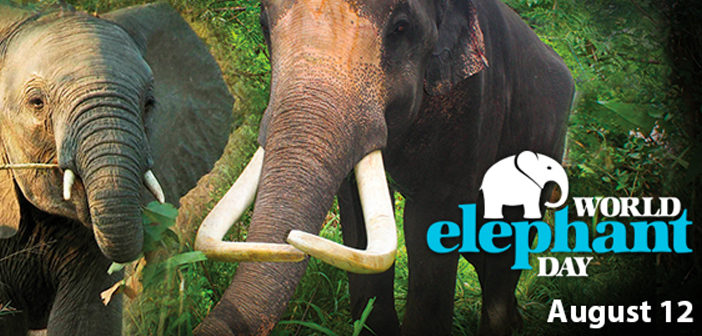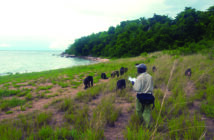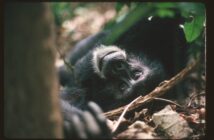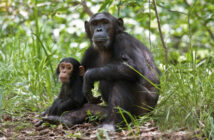Today is World Elephant Day and I am thinking of the magical times when I have been privileged to watch wild elephants in different places in Africa. How wonderful it was to see them feeding, using their trunks like hands to pick leaves overhead, or tear up lush green grass in great bunches, then push the food into their mouths. And special times when I watched them bathing in a river, sucking up trunk fulls of water and squirting it over their backs, sometimes submerging with just the tips of their trunks showing like periscopes above the water. And what fun the young elephants have playing in the water, squirting each other and messing about like kids in a swimming pool.
Coming across them in a forest can be scary. Once I heard elephants outside the cabin where I was staying and went out to see if I could see them. It was a forested area, and as I stood, listening, I could hear sticks cracking under elephant feet. Otherwise they made no sound. I bent to peer through the trees, and was just about to put my hand on a grey tree trunk when – just in time – I saw that it was an elephant leg! Fortunately the wind was blowing my scent away from him – or her. I retreated silently back to the cabin, my heart pounding. On a previous posting I described some of the elephants I got to know personally, so I encourage you to read it just in case you missed it last time.
Today, thanks to long term studies like those of Iain Douglas-Hamilton and Cynthia Moss, we know a good deal about the elephant’s rich social life. There are close supportive bonds between family members that can last throughout their 60 or so years of life. They have the same emotions of happiness, sadness, fear, despair and so on as we do. They try to help family members or friends who are wounded. And they grieve when one dies. And, because of the value of ivory, nearly 100 elephants die every day. Each one with his or her own personality and a valued member of the herd. Each one an individual that mattered. Each one deserving of respect. And each one destroyed simply in order to obtain their tusks – even juveniles are killed and their tiny tusks hacked out. Bodies butchered, trunks that get in the way chopped off and thrown aside. Family bonds broken. Imagine the terror and the desperate grief of those left behind – spared because they had no tusks, or because they managed to escape. This carnage is not only driving a species towards extinction; it is causing massive individual suffering.
On this World Elephant Day I think also of those who risk their lives to combat the poachers on the ground – the heroic Rangers. On World Ranger Day, Farai Sevenzo, reporting from Africa, noted that gangs of poachers probably kill two or three rangers every week in game reserves across Africa. “Organized criminals with sophisticated GPS systems and deadly arms seem to stop at nothing to get tusks to sell in Asian markets for millions of dollars. It is the rangers who stand between them and the killers.” And their bravery is often displeasing to corrupt officials, to those in power who are involved in the illegal and highly lucrative export of ivory – so that rangers, despite their heroic efforts, are so often underpaid, under equipped and undervalued in so many countries in Africa. It is not surprising that many do not want their children to become rangers.
Every ivory ornament, bracelet, pendant or trinket represents a slaughtered elephant and some also a slaughtered ranger. For the elephants and those who try to save them this World Elephant Day, is just a day like any other day. I wonder how many elephants will be killed, how many tiny calves will lose their mothers? How many rangers will be murdered?
We must act now before it is too late. We must join forces everywhere to stop the slaughter of elephants, for unless we work together to tackle the problem elephants could become extinct in the wild – and quite soon. How terrible if that time comes, and our great great grandchildren only know elephants from archival photos, and picture books and films. It is true that some countries have already banned the trade in ivory and even had highly publicized events when tons of illegal ivory was burned or crushed. And some have banned the domestic buying and selling of ivory – for this opens up a loophole for corrupt dealers to continue their trade in illegal ivory. The United States has almost entirely banned their domestic trade. My own country, the United Kingdom, has not. I am ashamed.
Let us pledge on this day to fight harder, each one of us who cares. What can we do? We can persuade people to stop buying ivory. We can donate to those charities working to protect elephants in the countries where they live or to those who support the rangers who are working to protect the elephants. We can put pressure on our governments, when this is needed, to ban the import and export and domestic trade in ivory. And we must also spare a thought for all those elephants who suffer cruel treatment in captivity in Asia, those still forced to perform in circuses, those who languish in zoos. We can protest these cruelties. And we can make use of social media to connect with each other, to amplify our concern. We can blog, sign petitions, share content on Facebook and Twitter, and so much more.






